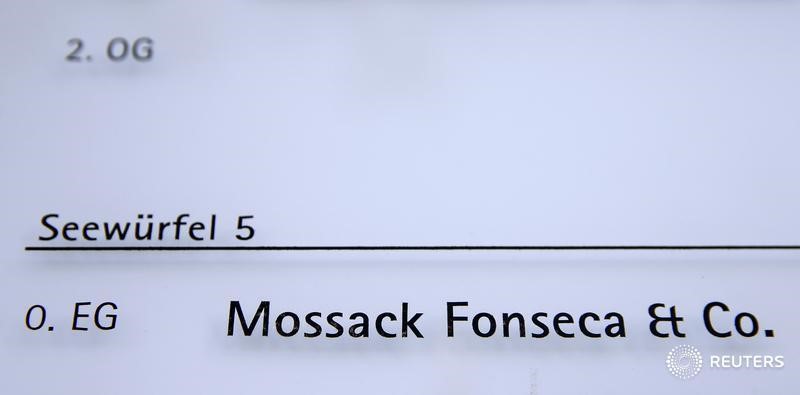By Gram Slattery
SANTIAGO, April 4 (Reuters) - The president of the Chilean
branch of Transparency International resigned on Monday after
documents from a Panamanian law firm showed he was linked to at
least five offshore companies.
"Gonzalo Delaveau presented his resignation as the president
of Transparency Chile, which has been accepted by the board of
directors," the national body wrote on Twitter.
Delaveau was among tens of thousands of people named in a
leak of four decades' worth of documents from Mossack Fonseca, a
Panamanian law firm that specialized in setting up offshore
businesses.
The "Panama Papers" were leaked to more than 100 news
organizations around the world cooperating with the U.S.-based
International Consortium of Investigative Journalists, or ICIJ,
including Chilean watchdog CIPER.
While Delaveau is not accused of illegal activity, the leaks
called into question his post at Transparency International, a
German-based organization that seeks to monitor and root out
corporate and political corruption worldwide.
According to CIPER, Delaveau, a lawyer, acts as a
representative for Turnbrook Corporation, DK Corporation,
Heatlhey International Inc, Turnbrook Mining Ltd and Vizcachitas
Ltd, all of which are domiciled in the Bahamas.
Delaveau also serves as a director for Turnbrook Mining,
which owns 51.6 percent of Los Andes Copper, a Canadian
exploration and development company currently focused on a mine
project north of Chile's capital, Santiago.
Delaveau could not be reached for comment.
In response to questions from CIPER, he said he was a
director only at Turnbrook Mining and that his relations with
the other companies were consistent with his role as a lawyer
and legal clerk.
He added in an interview with a local radio station that he
was "extremely surprised" by the "gray, dark area" of Mossack
Fonseca.
Delaveau's resignation came hours after Chile's tax
authority announced the beginning of an "intense follow-up" of
the Chileans mentioned in the Panama Papers, who range from
ex-soccer stars to newspaper magnates.
The disclosures also come as Chile deals with political and
corporate corruption scandals that have left Chileans angry with
the entire professional class and eroded the government's
popularity.
- English (USA)
- English (UK)
- English (India)
- English (Australia)
- English (South Africa)
- English (Philippines)
- English (Nigeria)
- Deutsch
- Español (España)
- Español (México)
- Français
- Italiano
- Nederlands
- Português (Portugal)
- Polski
- Português (Brasil)
- Русский
- Türkçe
- العربية
- Ελληνικά
- Svenska
- Suomi
- עברית
- 日本語
- 한국어
- 简体中文
- 繁體中文
- Bahasa Indonesia
- Bahasa Melayu
- ไทย
- Tiếng Việt
- हिंदी
Chile's head of Transparency International resigns after 'Panama Papers'
Published 2016-04-04, 08:55 p/m
Chile's head of Transparency International resigns after 'Panama Papers'

Latest comments
Install Our App
Risk Disclosure: Trading in financial instruments and/or cryptocurrencies involves high risks including the risk of losing some, or all, of your investment amount, and may not be suitable for all investors. Prices of cryptocurrencies are extremely volatile and may be affected by external factors such as financial, regulatory or political events. Trading on margin increases the financial risks.
Before deciding to trade in financial instrument or cryptocurrencies you should be fully informed of the risks and costs associated with trading the financial markets, carefully consider your investment objectives, level of experience, and risk appetite, and seek professional advice where needed.
Fusion Media would like to remind you that the data contained in this website is not necessarily real-time nor accurate. The data and prices on the website are not necessarily provided by any market or exchange, but may be provided by market makers, and so prices may not be accurate and may differ from the actual price at any given market, meaning prices are indicative and not appropriate for trading purposes. Fusion Media and any provider of the data contained in this website will not accept liability for any loss or damage as a result of your trading, or your reliance on the information contained within this website.
It is prohibited to use, store, reproduce, display, modify, transmit or distribute the data contained in this website without the explicit prior written permission of Fusion Media and/or the data provider. All intellectual property rights are reserved by the providers and/or the exchange providing the data contained in this website.
Fusion Media may be compensated by the advertisers that appear on the website, based on your interaction with the advertisements or advertisers.
Before deciding to trade in financial instrument or cryptocurrencies you should be fully informed of the risks and costs associated with trading the financial markets, carefully consider your investment objectives, level of experience, and risk appetite, and seek professional advice where needed.
Fusion Media would like to remind you that the data contained in this website is not necessarily real-time nor accurate. The data and prices on the website are not necessarily provided by any market or exchange, but may be provided by market makers, and so prices may not be accurate and may differ from the actual price at any given market, meaning prices are indicative and not appropriate for trading purposes. Fusion Media and any provider of the data contained in this website will not accept liability for any loss or damage as a result of your trading, or your reliance on the information contained within this website.
It is prohibited to use, store, reproduce, display, modify, transmit or distribute the data contained in this website without the explicit prior written permission of Fusion Media and/or the data provider. All intellectual property rights are reserved by the providers and/or the exchange providing the data contained in this website.
Fusion Media may be compensated by the advertisers that appear on the website, based on your interaction with the advertisements or advertisers.
© 2007-2024 - Fusion Media Limited. All Rights Reserved.